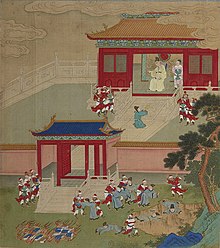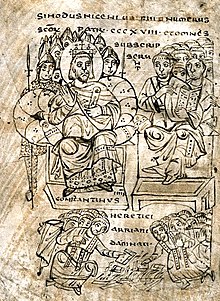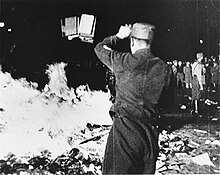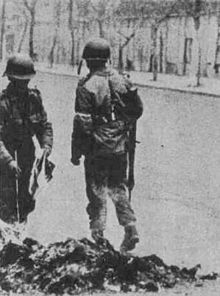List of book-burning incidents
[2] According to Diogenes Laërtius, the above outspoken agnostic position taken by Protagoras aroused anger, causing the Athenians to expel him from their city, where the authorities ordered all copies of the book to be collected and burned in the marketplace.
[4] However, the classicist John Burnet doubts this account, as both Diogenes Laërtius and Cicero wrote hundreds of years later and no such persecution of Protagoras is mentioned by contemporaries who make extensive references to this philosopher.
[13] In 168 BC the Seleucid monarch Antiochus IV ordered Jewish 'Books of the Law' found in Jerusalem to be 'rent in pieces' and burned[14] – part of the series of persecutions which precipitated the revolt of the Maccabees.
[15][16][17] Suetonius tells us that, at the death of Marcus Lepidus (about 13 BC), Augustus assumed the office of Chief Priest, and burned over two thousand copies of Greek and Latin prophetic verse then current, the work of anonymous or unrespected authors (preserving the Sibylline Books).
[53] The rebellious monk Arnold of Brescia – Abelard's pupil and colleague – refused to abjure his views after they were condemned at the Synod of Sens in 1141, and went on to lead the Commune of Rome in direct opposition to the Pope, until he was executed in 1155.
The copper-plate document known as Dhanbidhū Lōmāfānu gives information about events in the southern Haddhunmathi Atoll, which had been a major center of Buddhism – where monks were beheaded, and statues of Vairocana, the transcendent Buddha, were destroyed.
[citation needed] Maimonides' major philosophical and theological work, "Guide for the Perplexed", got highly mixed reactions from fellow-Jews of his and later times – some revering it and viewing it as a triumph, while others deemed many of its ideas heretical, banning it and on some occasions burning copies of it.
[71][72] The De heretico comburendo ("On the Burning of Heretics"), a law passed by the English Parliament under King Henry IV of England in 1401, was intended to stamp out "heresy" and in particular the Lollard movement, followers of John Wycliffe.
Upon his death in prison, John II of Castile ordered his confessor Bishop Barrientos to burn Villena's library[76] The poet Juan de Mena skewered the bishop for this destruction in his Labyrinth of Fortune[77] and others accused him of plundering it for the purpose of later plagiarizing the works himself, but Barrientos portrayed himself as bound by his king's orders and as having done what he could to preserve the library's most important works:[citation needed] Your Majesty, after the death of Don Enrique de Villena, as a Christian king, you sent me, your devoted follower, to burn his books, which I executed in the presence of your servants.
It contained his most esoteric beliefs, including an objection to some of the basic tenets of Christianity and an explicit advocacy of a restoration (in modified form) of the worship of gods of the Classical Greek mythology – obviously heretical as the Orthodox Church understood the term.
Morea was under invasion from Sultan Mehmet II, and Theodora escaped with Demetrios to Constantinople where she gave the manuscript back to Gennadius, reluctant to herself destroy the only copy of such a distinguished scholar's work.
[citation needed] In 1553, Servetus was burned as a heretic at the order of the city council of Geneva, dominated by Calvin – because a remark in his translation of Ptolemy's Geographia was considered an intolerable heresy.
[88] The Historie of Italie (1549), a scholarly and in itself not particularly controversial book by William Thomas, was in 1554 "suppressed and publicly burnt" by order of Queen Mary I of England – after its author was executed on charges of treason.
Allen Wells calls his work an "ethnographic masterpiece",[97] while William J. Folan, Laraine A. Fletcher and Ellen R. Kintz have written that Landa's account of Maya social organization and towns before conquest is a "gem.
[103][104] Sixty identified printed books, pamphlets and broadsheets and 3 newsbooks were ordered to be burned during this turbulent period, spanning the English Civil War and Oliver Cromwell's rule.
Though Luzzatto in later life got considerable renown among Jews and his later books were highly esteemed, most of the early writings were considered irrevocably lost until some of them turned up in 1958 in a manuscript preserved in the Library of Oxford.
[116] In 1750, the Imperial Book Commission of the Holy Roman Empire at Frankfurt/Main ordered the wholesale burning of the works of Johann Christian Edelmann, a radical disciple of Spinoza who had outraged the Lutheran and Calvinist clergies by his Deism, his championing of sexual freedom and his asserting that Jesus had been a human being and not the Son of God.
With Frankfurt's entire magistracy and municipal government in attendance and seventy guards to hold back the crowds, nearly a thousand copies of Edelmann's writings were tossed on to a tower of flaming birch wood.
[137] In 1923 the anarchist Guy Aldred and his partner and co-worker Rose Witcop, a birth control activist, published together a British edition of Margaret Sanger's Family Limitation – a key pioneering work on the subject.
[144] In 1939, shortly after the surrender of Barcelona, Franco's troops burned the entire library of Pompeu Fabra, the main author of the normative reform of contemporary Catalan language, while shouting "¡Abajo la inteligencia!"
The books that were burned included works by Albert Einstein, Vicki Baum, Bertolt Brecht, Heinrich Heine, Helen Keller, Thomas Mann, Karl Marx, Erich Maria Remarque, Frank Wedekind, Ernest Hemingway and H. G. Wells.
[149] During World War II the French writer and anti-Nazi resistance fighter André Malraux worked on a long novel, The Struggle Against the Angel, the manuscript of which was destroyed by the Gestapo upon his capture in 1944.
Deputy director of Tammi Jarl Hellemann later argued that the fuss about the book was completely disproportionate to its substance, describing the incident as the first instance of Finnish self-censorship motivated by concerns about relations to the Soviet Union.
[citation needed] Following the 1964 Brazilian coup d'état, General Justino Alves Bastos, commander of the Third Army, ordered, in Rio Grande do Sul, the burning of all "subversive books".
[172][173] In 1965, the British publishing house Penguin Books was torn by an intense power struggle, with chief editor Tony Godwin and the board of directors attempting to remove the company founder Allen Lane.
One of the acts taken by Lane in an effort to retain his position was to steal and burn the entire print run of the English edition of Massacre by the French cartoonist Siné, whose content was reportedly "deeply offensive".
[182][183] On March 23, 1980, Yad L'Achim, an Orthodox Jewish counter-missionary organisation that was at the time a beneficiary of subsidies from the Israeli Ministry of Religion, ceremonially incinerated hundreds of copies of the New Testament publicly in Jerusalem.
[208][209] In January 2001, the Egyptian Ministry of Culture ordered the burning of some 6,000 books of homoerotic poetry by the well-known 8th century Persian-Arab poet Abu Nuwas, even though his writings are considered classics of Arab literature.
[212] The national library housed rare volumes and documents from as far back as the 16th century, including entire royal court records and files from the period when Iraq was part of the Ottoman Empire.
[241] Sometime during the weekend of April 15–17, 2011, books and other items designated for a new public library in the Fundamentalist Church of Jesus Christ of Latter-Day Saints polygamous community Colorado City, Arizona, were removed from the facility where they had been stored and burned nearby.





